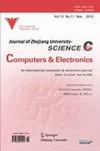源代码可分发性验证的分析模型
Journal of Zhejiang University-Science C-Computers & Electronics
Pub Date : 2014-02-01
DOI:10.1631/jzus.C1300066
引用次数: 1
摘要
加快顺序程序执行速度的一种方法是将它们划分为并发段,并在分布式计算环境中以并行方式执行这些段。我们认为,执行加速主要取决于识别段之间的并发程度以及段之间的通信开销。为了保证最佳的加速,我们必须在考虑通信开销的情况下,获得识别段之间最大可能的并发度。现有的代码分发器和多线程方法不能满足这些要求;因此,它们不能提前提供预期的可分发性收益。为了克服这些限制,我们提出了一种新的方法来验证顺序面向对象程序的可分布性。所提出的方法使用户能够在实际可分发性实现之前看到最大的加速增益,因为它计算了一个目标函数,用于测量来自同一程序的不同分布值,同时考虑了远程和顺序调用。实验结果表明,与实际应用程序的顺序和分布式实现相比,该方法成功地确定了不同软件应用程序的可分布性。本文章由计算机程序翻译,如有差异,请以英文原文为准。
An analytical model for source code distributability verification
One way to speed up the execution of sequential programs is to divide them into concurrent segments and execute such segments in a parallel manner over a distributed computing environment. We argue that the execution speedup primarily depends on the concurrency degree between the identified segments as well as communication overhead between the segments. To guarantee the best speedup, we have to obtain the maximum possible concurrency degree between the identified segments, taking communication overhead into consideration. Existing code distributor and multi-threading approaches do not fulfill such requirements; hence, they cannot provide expected distributability gains in advance. To overcome such limitations, we propose a novel approach for verifying the distributability of sequential object-oriented programs. The proposed approach enables users to see the maximum speedup gains before the actual distributability implementations, as it computes an objective function which is used to measure different distribution values from the same program, taking into consideration both remote and sequential calls. Experimental results showed that the proposed approach successfully determines the distributability of different real-life software applications compared with their real-life sequential and distributed implementations.
求助全文
通过发布文献求助,成功后即可免费获取论文全文。
去求助
来源期刊
自引率
0.00%
发文量
0
审稿时长
2.66667 months

 求助内容:
求助内容: 应助结果提醒方式:
应助结果提醒方式:


